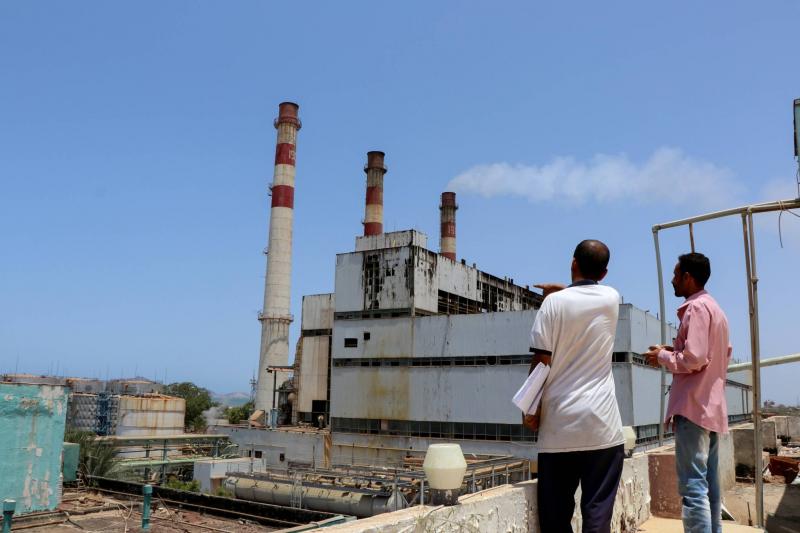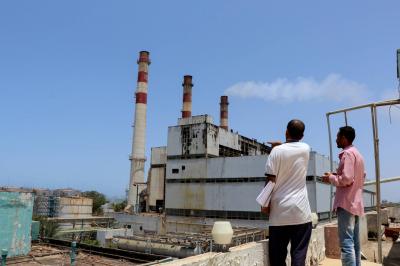The electricity crisis in Aden, which is the temporary capital of the internationally recognized Yemeni government, has worsened due to a shortage of fuel needed to operate power generation stations. This has caused residents to receive electricity for no more than six hours a day, intermittently. Despite being one of the first cities in the Gulf to receive electricity at the end of the 19th century under British rule, its residents now suffer in temperatures exceeding 40 degrees Celsius.
Yemeni Abdullah Aziz, 75, who was a minister in the former People's Democratic Republic of Yemen before the Yemeni unification in 1990, laments the worsening economic and social conditions in his city. "Aden is living its worst days, with the Presidential Leadership Council and the government being passive... ministers are deep asleep in their residences at the Maasheeq Palace while Aden's residents slowly die from the heat," he says. He warns that the continued deterioration in Aden without real solutions could lead to social tensions whose consequences are unpredictable.
Residents of Aden blame the internationally recognized government for the absence of basic services. The Electricity Corporation states that the increasing power outages in Aden, which has a major port, are due to reduced generation capacity at power stations because of fuel shortages and the end of a Saudi grant for oil derivatives at the beginning of the month. Salem Al-Walidi, director of the Aden Electricity Corporation, stated, "The corporation has requested the higher authorities in the state since the moment the Saudi fuel grant ended to secure enough fuel for the electricity stations, especially amid rising temperatures."
Al-Walidi affirmed that the electricity sector faces significant and accumulated challenges for years, noting that the total power needed for Aden exceeds 610 megawatts, while the stations only produce less than 310 megawatts daily, which is nearly half of the needs. He indicated that the political conflict among the ruling partners, referring to the Yemeni government and the Southern Transitional Council, has greatly affected the economic conditions and services in Aden, particularly electricity.
Saudi Arabia announced a new grant of oil derivatives valued at $200 million in late September to support the faltering electricity sector in Yemen and to provide fuel for about 70 electricity power stations in the government-controlled provinces in the south and east of the country. During the last government meeting, the Yemeni government called on the Saudi leadership to expedite the support package previously announced to meet commitments. Saudi authorities have stipulated that the Yemeni government implement structural and financial reforms in the energy sector, including collecting service fees from subscribers, in order for the oil grants to continue.
A senior official in the Southern Transitional Council, speaking to Reuters on condition of anonymity, stated that the delay in supplying fuel to power generation stations aims to punish the southern provinces for their call for self-determination. Flags of the former South Yemen, which unified with North Yemen in 1990, fly in the streets of Aden, where waste accumulates and the sewage crisis worsens. High temperatures have exacerbated public anger in Aden over the continued failure of the government to provide services, security, and stability for the coastal city residents and several neighboring cities.
Writer and artist Issam Khalidi described the suffering of Aden's residents as "lethal torturous doses intentional and in premeditation." He added, "Unfortunately, all of this happens under the watchful eyes of the President of the Presidential Council and the Prime Minister and their members residing in their luxurious palace." He warned, "This collective punishment will not continue to go unchallenged; the citizens' patience and endurance have run out."
Citizen Hashim Mohammed Naji, a 51-year-old government employee, expressed, "The current situation shows the failure of the state, the legitimate government, and the Transitional Council... People are dying and the cause is electricity... Enough is enough." Meanwhile, student Randa Yassin, in her third year of high school, expressed her frustration over the continuous power outages: "We started the official examinations a few days ago... and we rely on candles and battery-operated lamps."
Under the title "Where is the electricity, Minister?" the Minister of Electricity and Energy in the Yemeni government, Mani' Yaseen Bin Yameen, posted on his Facebook page, "Where is the electricity, Minister... I recently reached the point where I can hardly introduce myself, not from weakness or lack of confidence, but from shame... I took over the Ministry of Electricity and I can almost guarantee that I know its strengths and shortcomings. I took over knowing that I would be directly faced with a people who have suffered all service pain."
He continued, "Every citizen in this country must know that the state's resources are not enough to operate electricity daily at its current state to cover the total electricity needs due to the high production costs, primarily due to the haphazard operation without referring to specialists in due time." The Yemeni government claims that it spends the equivalent of $1.2 billion annually, amounting to $100 million monthly, to provide fuel and lease electricity generation stations, yet revenues do not reach $50 million annually. The complex war, now in its ninth year in Yemen, has led to what the United Nations describes as the world's largest humanitarian crisis.




